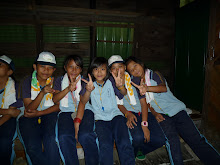Goal of interview: to find out the essence of Paiwan's tattoo art
Interviewee: Chief Dremedraman
Location: Tribe Jiahsian, Ping-Tung County, Taiwan
Date: Jan. 24, 2010
In order to develop a cultural archetype based on native Taiwanese background, an interview was conducted with a Paiwan elder from the tribe Jiahsin, to further make sure this archetype will not lose her trace as a native Taiwanese too much. However, unfortunately due to a burglary happened 2 weeks ago much of the information was lost along with the missing computer where I stored all the data. FUCK! and...yeh, welcome to Nottingham! the city of Robin Hood...

anyway, I tried to refresh my head and piece all my left memory together...
Before the interview I have listed a few key questions I intended to ask as the following:
- What are the meanings of the tattoo? Why?
- Where do these tattoo appear? at what age?
- Any gender difference for tattoo?
- Is there a prerequisite before getting a tattoo?
- Do the tattoo follow a certain form or they can be modified?
So here it goes, I set my trip to the tribe Jiahsin, along with a Paiwan language translater,
Luzeng Dulaulauzang, who was my co-worker
here was basically how the interview went that day ( Jan. 24. 2010)
It was a sunny morning, the interviewed vuvu named Dremedreman (meaning elder in Paiwan language)
was the cheif of that tribe.
Vuvu Dremedreman is said to be 93 who yet looks like 60, with very fair skin tone...
for some reason vuvu started out from her ancestry, she claimed that she is of mixed heritage
that results to her white skin-tone (Paiwan people are usually known for their mocha color).
She knew i'm of Bailang (indigenous term for non-native) and indigenous heritage mix as well, so then she carries on how her relatives also inter marry with other racial groups and so on...and
how in Japanese colonial era that some Japanese and Bailang kids were adopted to Paiwan, which explains why some Paiwan people are very fair today...bla bla bla, took forever to
get to my topic on tattoo art...
so interview finally cuts to the point:
what the meanings of tattoo?
Tattoo is "Butsik" in Paiwan language
Vuvu explains that butsik is a symbol for noble class people, as Paiwan had a caste system (the system no longer exists after Japanese era) not quite exactly similar to Indian's, Paiwan people are divided to 4 classes as "Cheif", "Noble Class", Warrior", "Peasants"...only the Chief and noble classes had the right tattoo themselves. Therefore, the tattoo symbolizes a person's status, and it also tells the lineage of the person's family as well...however, interestingly, the person's status can change through marrying a higher class, and his/her heir will inherit the same class....
she laughs when she brings this up: "Everyone Paiwan is a noble class nowadays, we have Muni everywhere..." (Muni is a common name for noble class woman)
So where do butsik appear normally:
as vuvu shows her hands with tattoo all over, she says that women have their butsik on the back of hands, while men have their on the chest, and sometimes on the butt, interestingly, cus no one will see it unless the man is naked...
When?
vuvu doesn't quite answer my question, but she replies that she got her butsik when she was around 16, which is the age that girls got married at that time ( 80 years ago?)...
but she does mention that only a innocent, clean woman gets a butsik (only for the higher class)
So my final question: is the tattoo modifiable?
Still, vuvu does not quite answer my question, or my translater doesn't do her job well
translating...
Vuvu Dremedraman says that each family of the chief and noble classes have different tattoo, the tattoo is given by the witches and elders in the village. When being tattooed, it brings great pain to the hands only second to giving birth to a baby. The process of making tattoo is using tree branches with charcoal power, along with a hammer to stick the power onto hand( i don't quite understand this part honestly)...
At the end of conversation, a very mussy feeling...
vuvu Dremedraman says: soon one day, she is going to leave with the butsik...
There's currently only 11 elders who still have the butsik, and they're all dying soon...
signifies the vanishment of a tradition...
 vuvu's butsik:
vuvu's butsik:the signature of a chief,
one of few pictures saved in a pendrive without being stolen...

No comments:
Post a Comment